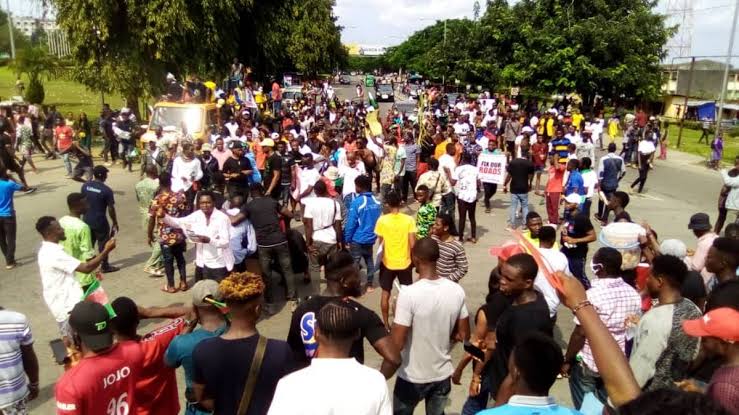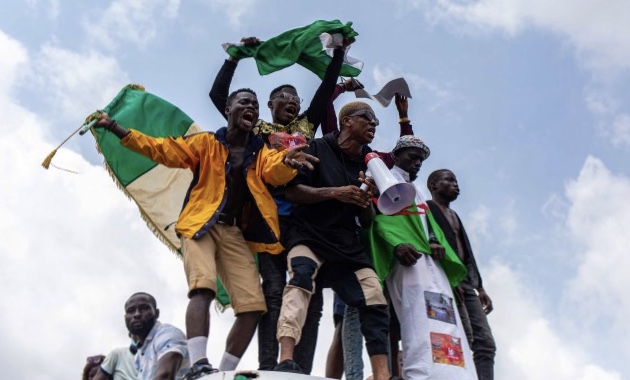By Jonathan Ugbal
Nigerian authorities should conduct a swift and transparent investigation into recent attacks on journalists and media outlets and ensure that the press can cover ongoing protests safely, the Committee to Protect Journalists (CPJ) said on Monday.
Since October 5, police and demonstrators have attacked at least 12 journalists covering protests against police brutality and calling for the abolition of the country’s Federal Special Anti-Robbery Squad police unit, and at least five news outlets have been attacked, according to news reports and journalists who spoke to CPJ.
“It is a tragic irony that journalists have been repeatedly attacked, including by uniformed members of Nigeria’s security forces, as they report on protests against police brutality,” said Angela Quintal, CPJ’s Africa program coordinator, from New York.
“Unfortunately, the violence we have seen against Nigeria’s press in recent days is consistent with the violence that journalists in the country routinely face. Nigerian authorities must take immediate action to hold those responsible to account and ensure the media can work safely.”
On October 5, at least five police officers attacked Ebuka Onyeji, a reporter with the privately owned Premium Times online newspaper, while he was covering protests around the Federal Secretariat government buildings in Abuja, Nigeria’s capital, according to a report by the outlet and the journalist, who spoke with CPJ by phone.

Demonstrations organised on social media erupted earlier this month calling for the abolition of a notorious police unit accused of unlawful arrests, torture and extra-judicial killings.
The government gave in to the demand on October 11, 2020, announcing that the federal Special Anti-Robbery Squad (SARS) was being disbanded in a rare concession to people power in Africa’s most populous nation. (Photo by Benson Ibeabuchi / AFP)
The police officers hit Onyeji on the head and arms with sticks, despite Onyeji identifying himself as a journalist, he said. He told CPJ that he ran away from the officers and went to a hospital for swelling in his arms, which has since subsided.
On October 11, Gimba Kakanda, a columnist with the privately owned Daily Trust newspaper, was attacked by police officers when he tried to pick up his car from near the Ministry of Women Affairs and Social Development in Abuja, according to Kakanda and a Daily Trust report. Kakanda said the officers hit him and his friend with sticks and their hands, smashed his phone, and took him and his friend to the nearby police headquarters after he identified himself as a journalist and showed them his press identification. “We are actually looking for your kind,” Kakanda said one of the officers told him in the Pidgin language after he showed them his press pass.
Kakanda said he and his friend were released the same day without charge, then went to the hospital and found he had sprained his right arm and left wrist. “They were actually aiming at my head, but I had to use my hand to guard myself from the sticks,” Kakanda told CPJ.

Also on October 11, police attacked Arise Television camera operator Francis Ogbonna and reporter Ferdinand Duruoha while they were covering protests in Abuja, according to a video shared on Twitter by Arise Television. Ogbonna and Duruoha told CPJ when contacted for comments via phone that they preferred not to speak on the matter because a process to resolve the matter had already begun between their office and the security officers.
On October 13, authorities in Abuja again attacked Duruoha, as well as two Arise Television camera operators, Jonah Udofia and Joshua Benjamin, according to a report by independent news site, International Centre for Investigative Reporting (ICIR) and the journalists who confirmed the incident with CPJ via phone but declined to comment further.
On October 12, a group of protesters in Bagada, a town in Nigeria’s western Lagos State, hit Television Continental presenter Theophilus Elamah in the chest and forced him and the cameraman he was working with, Julius Idowu, to leave the protest area, Elamah told CPJ in conversations via phone and messaging app.
On October 17, Oluwatoyin Yusuf, a journalist with the southwestern Osun State Broadcasting Corporation (OSBC) was attacked by unidentified men while covering a protest at the Olaiya roundabout, a junction in Ashogbo, the state capital, according to the journalist who spoke to CPJ by phone and a report by privately owned Sahara Reporters newspaper.
Yusuf, the assistant director for news and current affairs with OSBC, said the men threw a stone through the window of a vehicle where he had taken shelter from protests, injuring his head. According to the journalist, he saw blood gushing from his head and was rushed to the hospital where he received stitches. Yusuf told CPJ that he stayed in the hospital for three days; he said he has since returned to work but as of October 26 was still going to the hospital for daily checkups.
In a separate incident on October 21, a group of unknown men attacked the OSBC building with stones, breaking windows and destroying vehicles parked outside the compound before security officers intervened to stop them, Yusuf told CPJ by phone. He added that the station suspended broadcasting the day of the attack, resuming on October 26.
Also on October 21 in Lagos, unidentified men attacked the offices of Lagos State Television (LST) and the TVC broadcaster, according to media reports. The men destroyed cars outside the LST building, causing the staff to evacuate, reports said. At the TVC office, men stole equipment and burned parts of the building, according to reports. LST, TVC, and Max FM, which occupies the same center as TVC and is owned by the same company, all suspended and then resumed broadcasting, according to the journalists and a report by Premium Times.

While covering the October 21 attack on TVC, Ayo Makinde, a reporter with the privately owned Channels Television broadcaster, was assaulted by unidentified people, according to a report on Channels Television’s YouTube channel. In the report, Makinde described being thrown to the ground, suffering a sprained wrist and a laceration to the head. He said in the report that he is now “perfectly OK.”
Also on October 21, unidentified people twice attacked the privately-owned Nation newspaper in Lagos, setting cars outside on fire, shooting guns at the building, and stealing computers and broadcast equipment, according to a report by Premium Times and Nation editor Adeniyi Adesina, who spoke with CPJ via phone. The attack ended only when security forces and firefighters arrived and forced the attackers to leave, Adesina said.
On October 24, police repeatedly hit Akpokona Omafuaire, a senior photojournalist with the Vanguard newspaper, after he stopped his car on his way to the Nigeria Union of Journalists’ headquarters in Warri, a city in Nigeria’s southern Delta State, according to Omafuaire, who spoke with CPJ via phone and a report by Vanguard.
Omafuaire told CPJ that at least eight police officers were blocking the road as he was on his way to a NUJ meeting. He said he exited his car and told the officers he was on his way to the meeting, but they refused to let him pass. As he returned to his car, officers attacked him from behind with a machete, he said. He told CPJ that he ran into his vehicle and reversed it as officers smashed his car windows. A photo published in Vanguard shows long welts across Omafuaire’s back.
On October 26, Emmanuel Adeyemi, a correspondent with privately-owned The Sun newspaper, was shot by unidentified people as he traveled to the NUJ office in Lokoja, a city in Nigeria’s south-central Kogi state, according to a report by private news site CKN News and the NUJ chairman in the state, Momoh-Jimoh Adeiza who spoke with CPJ via phone. Adeyemi was taken to a hospital; as of October 26 he remained in critical condition, according to Adeiza.
CPJ’s calls and text messages on October 22 to Nigerian police spokesperson Frank Mba and Nigerian army spokesperson Musa Sagir went unanswered.
Since You Are Here, Support Good JournalismCrossRiverWatch was founded on the ideals of deploying tech tools to report in an ethical manner, news, views and analysis with a narrative that ensures transparency in governance, a good society and an accountable democracy. Everyone appreciates good journalism but it costs a lot of money. Nonetheless, it cannot be sacrificed on the altar of news commercialization. Consider making a modest contribution to support CrossRiverWatch's journalism of credibility and integrity in order to ensure that all have continuous free access to our noble endeavor. CLICK HERE |
New Feature: Don't miss any of our news again.Get all our articles in your facebook chat box.Click the Facebook Messenger Icon below to subscribe now
Text Advert by CRWatch :Place Yours

Will You To Learn How To Make Millions Of Naira Making Special Creams From Your Kitchen?.Click Here
Expose Your Business And Make More Sales. Advertise On CrossRiverWatch.com Today



Leave feedback about this